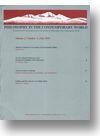|
1.
|
Philosophy in the Contemporary World:
Volume >
2 >
Issue: 3
John Howie
Human-Centered or Ecocentric Environmental Ethics?
abstract |
view |
rights & permissions
| cited by
Are ethical principles that guide human behavior suitable for the array of complex new environmental problems? Justice, nonmaleficence, noninterference, and fidelity seem by extension to apply. Conflicts between the principles of humanistic ethics and environmental ethics may perhaps be resolved, as Paul W. Taylor indicates, through the application of such “priority principles” as “self-defense,” “proportionality,” “minimum wrong,” and “restitutive justice.” Taylor suggests that these principles would forbid moral agents from perpetrating harm through direct killing, habitat destruction, environmental contamination, and pollution.
|
|
|
2.
|
Philosophy in the Contemporary World:
Volume >
2 >
Issue: 3
B. William Owen
On the Alleged Uniqueness and Incomprehensibility of the Holocaust
abstract |
view |
rights & permissions
| cited by
A number of philosophers have argued that the Holocaust is incapable of philosophical analysis and explanation. There are two arguments for this view: (1) that it is unique, and thus resists such analysis; and (2) that it is incomprehensible, and thus incapable of being understood. In this article, several versions of both of these arguments are considered and shown not to support the conclusion that the Holocaust resists philosophical explanation. An alternative route to philosophical explanation is then suggested.
|
|
|
4.
|
Philosophy in the Contemporary World:
Volume >
2 >
Issue: 3
Edward L. Schoen
Galileo and the Church:
An Untidy Affair
abstract |
view |
rights & permissions
| cited by
In his recent review of the Galileo affair, Pope John Paul II confidently proclaimed the intellectual autonomy of religion, comfortably affirming that the methods and ideas of religion are cleanly separable from those of the sciences. Unfortunately, a close review of the actual details of the Galilean controversy reveals that the lesson to be learned from that famous case is not one of sanitary intellectual compartmentalization, but one of entangling interdependencies among scientific, religious, and philosophical thought.
|
|





